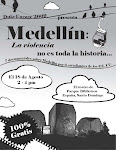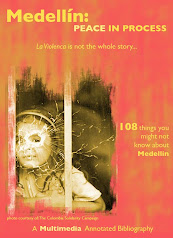"In the United States, information is accessible with the click of the mouse. College libraries offers a wealth of information, including subscriptions to thousands of academic journals, rows of books neatly organized by author and subject, and an array of multimedia materials. When in doubt, knowledgeable librarians are at your service, and if you can’t find what you need in one library, you are referred to another one. No subject of inquiry is too obscure. When I needed to find data on voting patterns of Parliament in the 1800s, I was able, within a few days, to find both primary and secondary resources in books and encyclopedias in the library at Duke and UCLA. Before I left for winter break to finish this final paper, I had scanned, copied, and printed several articles that I copied onto my flash drive and could read on the plane.
Thus, when I was faced with the task of finding information on the history of Comuna 13 and Aranjuez, two of some of the most well known and infamous neighborhoods in Medellin, I was surprised to find what appeared to me as a simple task in the United States, was actually one of the most frustrating and daunting assignments I had ever taken. Libraries here are high security, and I had to check in my things at each one, forcing me to lug around my laptop, charger, and reading glasses with me everywhere I went. In addition, I had to carry my camera to take pictures because in the Biblioteca Publico Piloto, there was no scanner available to scan in images that I had found. I also had to give them my identification number, which for all intensive purposes, is my birthday, and I had to report back this number to them when I left. I felt like I was an intruder in some kind of top secret government facility.
In the Biblioteca Publico Piloto, no videos were available, and the only newspaper articles that we found on Aranjuez and Comuna 13 at the earliest, dated back to only the early 1990s. In the Sala de Antiquoia, we found a huge thesis on Aranjuez, but we were not allowed to check it out or photocopy it. In the library at the University Nacional, the librarian presented us with a few books on the history of Medellin in general, with nothing specific to what we were looking for. The video archives were closed off to the general public because it was the summer and most of the audiovisual material that she could find us dealt solely with the violence of Medellin and were in VHS form.
In this arduous process of research, I realized how important this Historical Memory Project is and why we are doing it. At times, it may not be as tangible as some of the other DukeEngage Projects, especially because we may not see the results right away. However, making information about Medellin that is accessible, presentable, and unbiased in a medium that everyone can comprehend is something that few have done before. In this way, we are pioneer historians, paving the road for future documentarians. I hope that by telling this untold story of Medellin, I can add to the existing and scant archive of knowledge and make it easier for the next generation to find accurate information about this extraordinary city."




Post a Comment